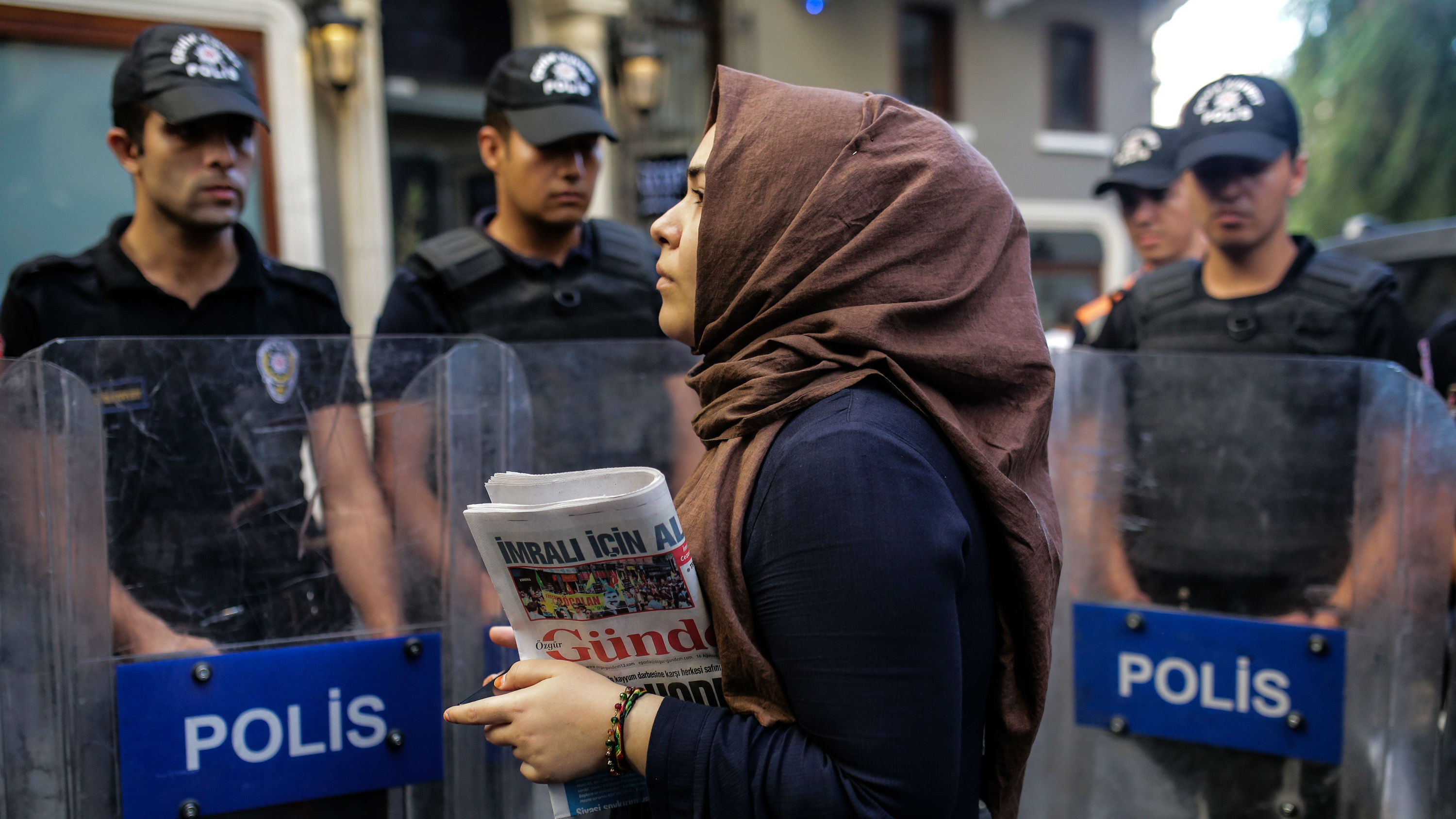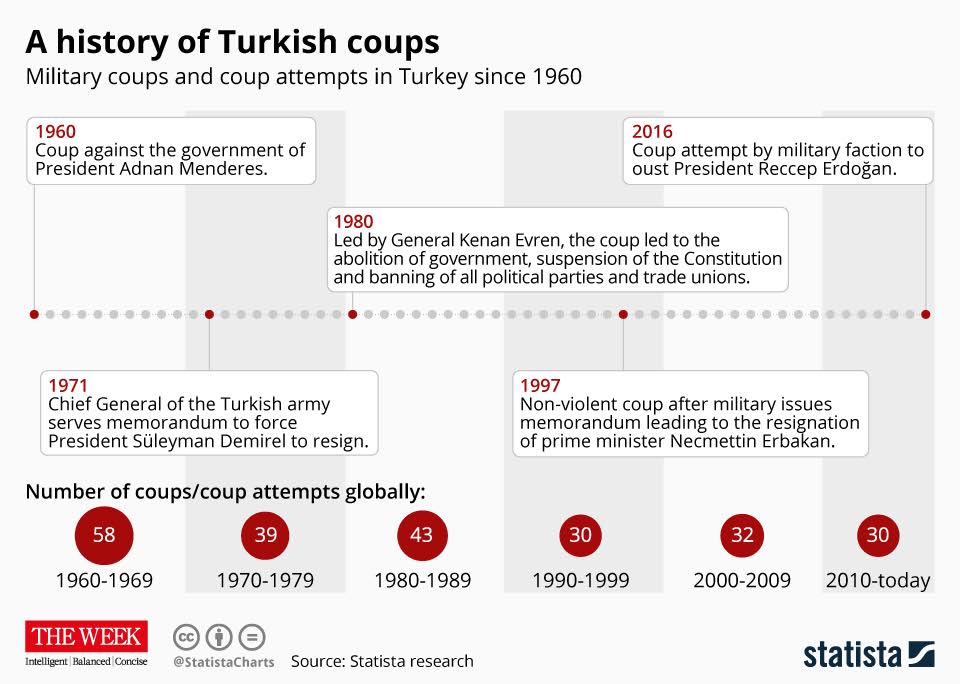Turkey suspends 12,800 police officers from duty
Recep Tayyip Erdogan continues to strengthen his grip on power after July's failed military coup

A free daily email with the biggest news stories of the day – and the best features from TheWeek.com
You are now subscribed
Your newsletter sign-up was successful
Turkey blocks WikiLeaks after AKP emails are published online
20 July
Turkey has blocked access to WikiLeaks after the online publication of thousands of emails linked to officials in the Justice and Development Party (AKP).
A trove of nearly 300,000 messages sent between 2010 and 2016 was made public.
The Week
Escape your echo chamber. Get the facts behind the news, plus analysis from multiple perspectives.

Sign up for The Week's Free Newsletters
From our morning news briefing to a weekly Good News Newsletter, get the best of The Week delivered directly to your inbox.
From our morning news briefing to a weekly Good News Newsletter, get the best of The Week delivered directly to your inbox.
WikiLeaks says the material was obtained a week before last Friday's attempted coup and it had pushed forward its publication in response to the post-coup purges being carried out by President Recep Tayyip Erdogan.
More than 50,000 people have been detained, fired or suspended in the wide-ranging crackdown on alleged dissenters. Yesterday, the purge was extended to education workers, with academics banned from travelling abroad and thousands of university deans and teachers forced to resign.
"Turkey extended the clear-out to the education sector because it says it wants to root out supporters of US-based cleric Fethullah Gulen, who it accuses of organising the attempted putsch," says the BBC.
The published material has been verified, says WikiLeaks, and its source is in no way connected to the attempted coup or to a rival political party or state.
A free daily email with the biggest news stories of the day – and the best features from TheWeek.com
The website also claims its infrastructure came under attack after it announced on Monday that it was going to publish the documents. While it could not locate the source of the attack, "the timing suggests a Turkish state power faction or its allies", it says.
This isn't the first time internet access has been blocked in Turkey - social media sites such as Facebook and Twitter have routinely been shut down in response to political events. "Critics and human rights advocates see [this] as part of a broader attack on the media and freedom of expression," says Reuters.
The ban on WikiLeaks came as the country's national security council prepared to hold its first meeting since the failed takeover last week. "It will be the president's first chance since the coup attempt to sit and talk in person with all key members of the government and armed forces," says the BBC.
Turkey feels economic impact of failed coup
19 July
The military phase of last Friday's failed coup attempt in Turkey may be over, but the economic ripples are still spreading.
Istanbul's National 100 stock exchange has fallen by seven per cent since the weekend, despite the government moving to calm fears by saying it had consulted the central bank and the Treasury and decided on "all necessary measures", reports the BBC.
The lire is down by more than five per cent and there are fears last week's events, and the revenge crackdown by President Recep Tayyip Erodgan, could hit tourism, which is crucial to the country's economy.
Shares in tourism-related companies have been the worst hit since Friday, with airport operator TAV down by 17.34 per cent and Turkish Airlines falling by 12.58 per cent.
Some 2.5 million Brits visit Turkey each year, but the number has been in steady decline after a series of terrorist bombings. Visitor numbers in May were down 35 per cent on last year.
The World Bank had already downgraded its growth forecast for next year from 4.5 per cent to 3.5 per cent.
EU leaders have called for "restraint and moderation" after Erdogan ordered the arrest of 7,500 military personnel, police and judges.
Belgian foreign minister Didier Reynders said the Turkish president's reaction to the attempted coup needed to be "proportionate."
British Foreign Secretary Boris Johnson has given his support to the EU's call for a restrained response.
Erdogan's revenge: 6,000 arrested in Turkey after failed coup
19 July
Turkish President Recep Tayyip Erdogan has detained more than 6,000 people in what has been described as a "revenge mission" for Friday's failed coup.
The attempted overthrow by a faction of the Turkish military calling itself the Peace Council began on Friday evening, when tanks blocked bridges in Istanbul and the entrance to the city's Ataturk airport. Presidential buildings and the Turkish parliament were attacked and TV stations were overrun by soldiers and forced off air.
The group pledged "to ensure and restore constitutional order, democracy, human rights and freedoms".
Erdogan urged his supporters onto the streets and, throughout Friday night and Saturday morning, tens of thousands of protesters and military forces loyal to the Turkish leader suppressed the coup, leaving at least 265 dead.
Sources inside the regime say the total number of arrests includes 2,839 soldiers, while arrest warrants have been issued for 2,745 judges.
The Daily Telegraph says this is "widely expected to mark the start of a purge of opposition forces" and that the "revenge mission" raises fears for the future of democracy in the region.
Erdogan himself has described the uprising as a "gift from God" because it will "be a reason to cleanse our army", while his justice minister, Bekir Bozdag, warned those involved in the coup will "pay a heavy price" and has called for the death penalty to be reintroduced.
The Turkish President has blamed Muslim cleric Fethullah Gulen, who is living in self-exile in Pennsylvania, for masterminding the attack and demanded that US authorities hand him over. But Gulen, who has been accused of choreographing the 2013 corruption scandal that engulfed senior Turkish ministers, suggested the uprising might have been staged by the government in a bid to consolidate the president's position and purge dissident voices.
Lina Khatib, the head of the Middle East and North Africa programme at Chatham House think-tank, told the Sunday Times that Turkey was likely to enter a period of "long-term unrest as even those Erdogan opponents who rejected the coup in the name of democracy see their rights curtailed in the name of stabilisation".
The mass arrests are "presumably a bid to secure Erdogan's grip on the Turkish state", says Patrick Cockburn in The Independent, and the Turkish leader may be "using the coup to eliminate the most powerful officials seen as loyal to Turkey as a secular state".

Infographic by www.statista.com for TheWeek.co.uk.
Turkey coup attempt: Erdogan reasserts control
16 July
President Recep Tayyip Erdogan of Turkey appears to have weathered a coup attempt after a night of violence in Ankara and Istanbul that claimed at least 90 lives.
The attempt to seize control was backed by a faction of the Turkish military which said it wanted "to ensure and restore constitutional order, democracy, human rights and freedoms".
Erdogan has been accused of undermining his country's tradition of secular government.
The attempted coup "began on Friday evening when tanks took up positions on key bridges in Istanbul", says the BBC. "Troops were seen on the streets and low-flying military jets were filmed over Ankara, the capital."
Presidential buildings and the Turkish parliament were attacked, and TV stations, including CNN Turk, were overrun by soldiers and forced off air.
Erdogan, who was on holiday in Marmaris, used an iPhone to broadcast a video message urging Turks to oppose the revolt. Many came out onto the streets to support him.
This morning he returned to Istanbul and appeared in person, denouncing the coup attempt and insisting that his government was in full control.
"However," says CNN, "the sounds of fighting were still being reported in Ankara and Istanbul after the chaotic attempt by members of the military to wrest control from Erdogan."
Sources inside the regime say that 1,563 soldiers have been arrested for their part in the insurrection.